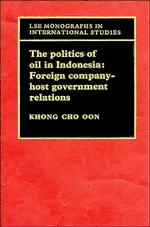Book contents
- Frontmatter
- Contents
- List of figures
- Acknowledgments
- 1 THE IMPACT OF THE FOREIGN COMPANY ON GOVERNMENT POLICIES IN LESS-DEVELOPED COUNTRIES
- 2 THE INDONESIAN PETROLEUM INDUSTRY: FORM AND CONTENT OF AGREEMENTS
- 3 FINANCIAL PROVISIONS AND CONSEQUENT AREAS OF DISPUTE
- 4 PROVISIONS FOR DEVELOPMENT AND NATIONAL CONTROL
- 5 PROBLEMS OF NEGOTIATION AND CONTRACTUAL CHANGE
- 6 ORGANISATIONAL STRUCTURE AND THE NEGOTIATING PROCESS
- 7 SOME REGIONAL CONSIDERATIONS FOR SOUTHEAST-ASIAN OIL-PRODUCER GOVERNMENTS
- 8 THE VIABILITY OF TRANSNATIONAL MINERAL AGREEMENTS
- Notes
- Select bibliography
- Index
2 - THE INDONESIAN PETROLEUM INDUSTRY: FORM AND CONTENT OF AGREEMENTS
Published online by Cambridge University Press: 05 November 2011
- Frontmatter
- Contents
- List of figures
- Acknowledgments
- 1 THE IMPACT OF THE FOREIGN COMPANY ON GOVERNMENT POLICIES IN LESS-DEVELOPED COUNTRIES
- 2 THE INDONESIAN PETROLEUM INDUSTRY: FORM AND CONTENT OF AGREEMENTS
- 3 FINANCIAL PROVISIONS AND CONSEQUENT AREAS OF DISPUTE
- 4 PROVISIONS FOR DEVELOPMENT AND NATIONAL CONTROL
- 5 PROBLEMS OF NEGOTIATION AND CONTRACTUAL CHANGE
- 6 ORGANISATIONAL STRUCTURE AND THE NEGOTIATING PROCESS
- 7 SOME REGIONAL CONSIDERATIONS FOR SOUTHEAST-ASIAN OIL-PRODUCER GOVERNMENTS
- 8 THE VIABILITY OF TRANSNATIONAL MINERAL AGREEMENTS
- Notes
- Select bibliography
- Index
Summary
INDONESIAN ATTITUDES TO FOREIGN INVESTMENT
In looking at successive Indonesian governments, the range of opinion to be found on the issue of foreign investment is not extreme. Considering the wide spectrum of Indonesian politics, a surprising degree of consensus obtained on the need for external economic support of some kind. Practically all Indonesian leaders, whatever their political background, held an almost implicit assumption that considerable foreign aid and investment was necessary, indeed indispensable, for national development. While most politicians were strongly inclined to change the structure of the economy, which had been shaped by the previous Dutch colonial administration, they had to reconcile national feeling with an underlying if contradictory regard for the importance of foreign investment in maintaining essential export earnings.
This dichotomy of attitudes had two effects. First, while efforts to remove foreign economic influence and to radically reorder the economy became a constantly reiterated theme of Indonesian political leaders, there was a tacit acceptance of foreign enterprise. Actual policies dealing with foreign firms were to prove much milder than public statements made in respect of them. Thus political conditions encouraged a divergence between the general tenor of public rhetoric and the actual concerns of the government of the day.
Secondly, while there was considerable public debate concerning the conditions under which foreign firms should be allowed into the country, their actual terms of operation were set by the limits of the economic structure.
- Type
- Chapter
- Information
- The Politics of Oil in IndonesiaForeign Company-Host Government Relations, pp. 23 - 50Publisher: Cambridge University PressPrint publication year: 1986

